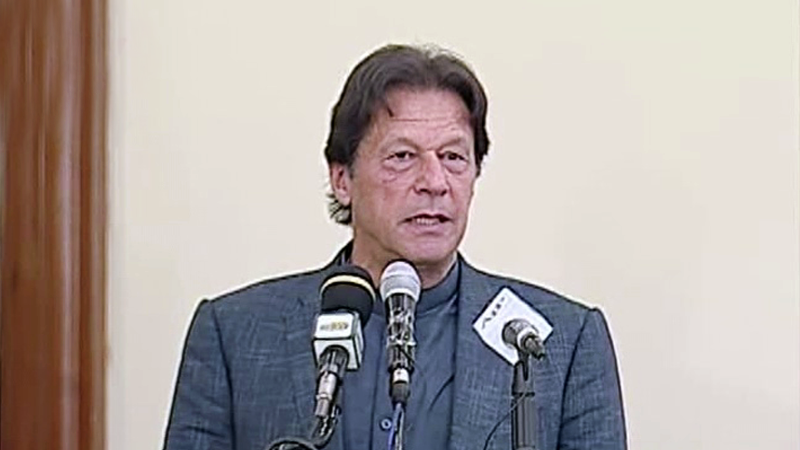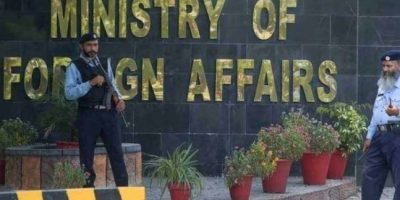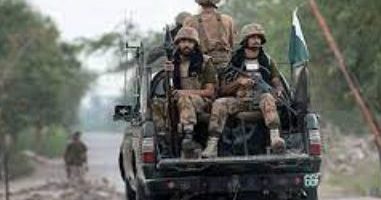PM Imran announces measures to curb smog, improve air quality

Prime Minister Imran Khan on Saturday announced the government’s decision to take concrete measures to curb air pollution in the country.
Addressing a press conference in Lahore, he expressed regret that over the past 10 years, a 70 per cent decline had been witnessed in the number of trees in the city.
“A 70 per cent drop in tree cover has meant far-reaching consequences,” he said.
He said that with a dense tree cover, pollution particles are absorbed by the leaves. And with them being cut, the city had faced a great loss.
The government’s anti air pollution measures at a glance:
- Oil that meets EU’s Euro-4 emission standard will now be imported. By the end of 2020, a shift will be made to oil that meets the Euro-5 emission standard.
- Oil refineries will be given a three-year warning period to improve the quality of oil produced. If they fail, they will be shut down.
- The auto industry will be asked to shift towards electric vehicles. All buses will either be hybrid, electric or CNG-based.
- Imported machinery will assist farmers to make use of the post-harvest rice crop, rather than burn it.
- Brick kilns will be given financial aid to use zigzag technology which is environmentally friendly.
- Import duties on scrubbers will be removed so air pollution from steel factories can be curbed.
- An urban forestry initiative in Lahore will see tree plantation over 60,000 kanals of land.
The premier noted that while crop burning in India and Pakistan as well as smoke from factories and brick kilns are all contributing factors to air pollution, the biggest contributor is vehicular smoke.
“What adds the most to air pollution is transport. [To combat] this, we have made certain decisions,” he said.
He said that Pakistan relies on 50-60 per cent of imports for oil and currently imports oil that meets the European Union’s Euro 2 emission standard. “We have decided we will import a more clean (environmental friendly) oil, [which will meet] the Euro 4 standard.”
“[This Euro 4 compliant oil] has fewer chemicals which pollute the air. By the end of 2020, we will shift to the Euro 5 emission standard. We feel this will have a 90 per cent impact on the quality of air.”
He said that the decisions had been made after a detailed meeting with Special Assistant to the Prime Minister (SAPM) on petroleum division, Nadeem Babar.
Announcing other measures, the prime minister said that oil refineries will be given a period of three years to improve the quality of oil produced. “The quality they are producing has a lot of pollutants.”
“If they do not move towards producing cleaner oil in this time, we will shut them down,” warned the premier.
He also announced that the government had decided to shift the focus of the auto industry towards electric vehicles. “We are holding talks with the car industries, because they have certain reservations.”
The prime minister said that an incentive policy will be introduced in 2020. He said the new government policy will lay special emphasis on buses.
“The buses that run across our cities will either be hybrid vehicles or electric. Or, we may insist on CNG, like in Delhi, where they run buses only on CNG.”
Speaking of the practice whereby farmers burn rice crop after its harvest, the premier said that imported machinery will be brought in which will facilitate the farmers to make use of the post-harvest crop, making it possible for it to be sold. This will ensure that there is no need to burn the crop, drastically reducing the air pollution caused otherwise.
He then spoke of steel factories and brick kilns, “which are the main sources of the hazardous, fine air particles known as PM2.5”.
The prime minister said that import duties on scrubbers will be removed, so that the steel factories can purchase them. Scrubbers are systems that use liquid (typically water) to remove particulates from industrial exhaust streams.
He said that similarly, brick kilns, will be financially aided by the government to use zigzag technology which will reduce air pollution.
Turning to Lahore, he said that an urban forestry initiative will be undertaken in the city. “We have identified 60,000 kanals of land where we will grow trees so they can clean the city’s air.”
“The impact will be slow. These are steps which should have been taken 20 years ago but no one bothered,” said the prime minister, adding: “We feel that every year people should see an improvement (in air quality). And in three years a significant difference will be seen.”
The prime minister recognised that Lahore is not the only city suffering from high levels of pollution. “It is an issue in Karachi, in Peshawar, in Pindi. This issue (of pollution) will greatly affect our future generations if we do not take steps to combat it today.”
“Pollution is a silent killer, unlike when you witness an accident or a murder. And it is very dangerous,” he said, regretting that Pakistan has now reached the top in the list of most polluted cities.
Related News

Pakistan issues demarche to Taliban regime after Afghan soil used to martyr soldiers
ISLAMABAD, DEC 19: The Foreign Office (FO) on Friday issued a demarche to the AfghanRead More

Security forces foil major suicide attack on North Waziristan Camp
RAWALPINDI, DEC 19: /DNA/ – In a heinous and cowardly terrorist act, Khwarij belonging toRead More


Comments are Closed